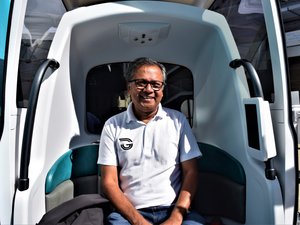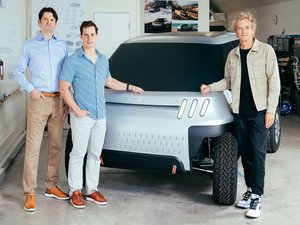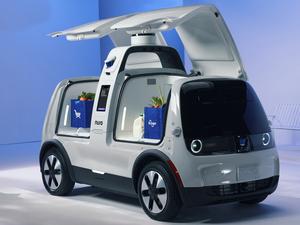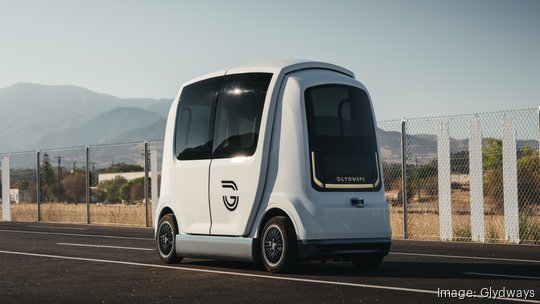
An autonomous shuttle startup based in South San Francisco has been selected for another major transportation project in the Bay Area less than six months after landing a similar project in San Jose.
Glydways will operate a fleet of its four-person autonomous shuttles in a proposed transportation project that will eventually carry passengers across 28 miles of connected roadways within four cities in Contra Costa County: Pittsburg, Antioch, Oakley and Brentwood.
The Contra Costa Transportation Authority selected Glydways as one of several private sector partners for the project, which is officially dubbed the "dynamic personal microtransit project."
On Thursday, Glydways announced that had been selected as a partner for the Contra Costa project.
The transportation authority's board selected a private sector group called the East County Connection Partners which includes Glydways, Plenary Americas, Flatiron West, Circlepoint and InfraStrategies for the project. They will also work in partnership with Tri Delta Transit, which serves the eastern part of Contra Costa.
Glydways and Plenary are also both working on a similar project in San Jose.
In April, the San Jose City Council selected a group of vendors which included Glydways and Plenary for an autonomous shuttle service that will whisk passengers along a 3.5 mile corridor between the Mineta International airport and Diridon Station.
The Contra Costa project will be eight times larger with 28 miles of connected roadways that were identified in a feasibility study completed in 2021. The project is expected to break ground within three to five years and has an estimated cost of $450 million, the transportation authority's executive director Timothy Haile told me.
As in the San Jose project, the autonomous shuttles that will eventually be deployed in Contra Costa will have their own dedicated paths and will not share roadways with other vehicles.
Overall, the goal is to give commuters another choice for so-called first-mile and last-mile transit within a multimodal system that includes public transit, walking, bicycling and private vehicles.
"It's your ride, your way," Haile said. "The whole idea is to complement public transportation and get people to public transportation."
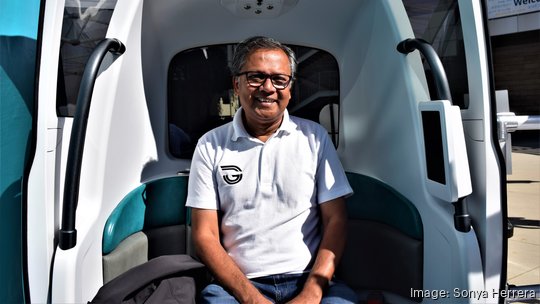
Glydways' shuttles can carry up to four passengers at a time.
Based in South San Francisco, Glydways was founded seven years ago by Mark Seeger, who stepped out of the CEO role earlier this year to become its chief strategy officer. The company's CFO, Gokul Hemmady, is currently interim CEO.
In August, Glydways raised $47 million in a Series B round that remained open, targeting as much as $57 million in total capital. On Thursday, Glydways said the round closed with $56 million and was led by New Science Ventures. Other investors also included the ACS Group, Gates Frontier and Khosla Ventures.
“We see our solution as ride hailing without congestion at a fraction of the cost,” Hemmady told the Information, which first reported the news on Thursday.
The autonomous shuttle system in Contra Costa will be available 24 hours a day, as well as affordable and accessible to riders with varied mobility needs, Haile said.
"We will be evaluating the business model of this," Haile said. "Our goal is to make sure the fare structure would be similar to public transportation. We want to make sure everyone will be able to use it, and that it will be equitable."
This isn't Contra Costa's first foray into autonomous transportation.
Earlier this year, the county launched a free autonomous shuttle service at Bishop Ranch in San Ramon. In 2019, the transportation authority received a $7.5 million grant from the U.S. Department of Transportation for three autonomous transportation projects in Walnut Creek and Martinez and along Interstate 680.
"It's important to focus on use cases and then what technology is the solution for that use case," Haile told me. "We're using different technologies and different vendors in each case."
Autonomous vehicles are now a common sight around the Bay Area.
Alphabet's Waymo and GM-backed Cruise have fleets of driverless cars carrying passengers around San Francisco now, though not without injuries and other incidents.
In August, Cruise was forced to cut its fleet of vehicles operating in San Francisco by half following a crash with a fire truck less than a week after state regulators gave Cruise and Waymo the green light expand in the city. San Francisco officials have also asked the California Public Utilities Commission, which regulates the so-called robotaxis, to suspend its authorization.
A pedestrian was trapped under a Cruise car in San Francisco earlier this week after getting hit by a different vehicle in a hit-and-run incident.
Waymo and Cruise have each reported dozens of incidents involving their autonomous vehicles since the beginning of 2022, according to a recent report from the San Francisco Standard.
